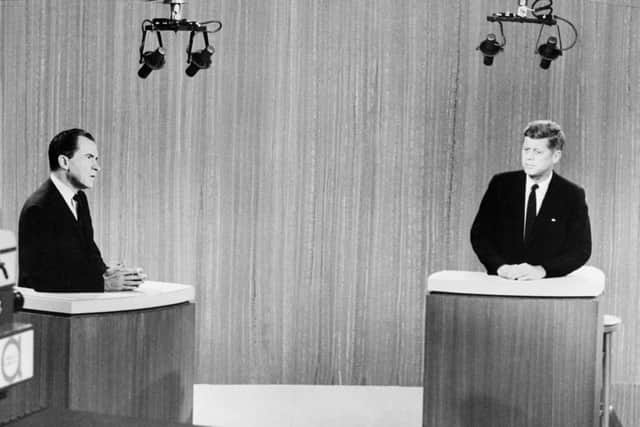Televised Tory leadership debates are a charade that sums up our trying times – Alastair Stewart
Conservative MPs have reportedly been panicked by just how much the debates have revealed the splits and rancour in their ranks, amid intense acrimony over tax, spending and where Boris Johnson fits in their narratives.
It was a masochist's dream watching all that mudslinging tarnish the practised campaign polish. However, beyond providing bookmakers and politicos with some damn good sport, is there any reason people should care about these debates?
Advertisement
Hide AdAdvertisement
Hide AdThe obvious answer is getting to know the future Prime Minister. But how much can seriously be gleaned from a Tory Lord of the Flies?
No one directly elects a Prime Minister. Party leaders are invited to form a government by the Queen. They remain in office so long as they can command the confidence of the House of Commons, usually with the most constituency MPs.
At least in Holyrood, a First Minister is formally nominated by the Scottish Parliament and then appointed by the Queen. Voting this way was vital for coalition agreements for Donald Dewar, his successors and their Liberal Democrat partners until Alex Salmond won a majority in 2011.
There have been 24 different Prime Ministers since 1900. The office has changed hands 28 times, with the likes of Winston Churchill and Harold Wilson having served twice, with someone else in office between their terms.


Ten out of 28 handovers followed a general election where the new Prime Minister led the party that had gained the most votes. One changeover happened after the notorious 1924 general election in which Labour's Ramsay Macdonald came second, formed a minority government, and became Prime Minister.
The remaining 17 handovers happened outside of the elections, and three were followed by an election called within 50 days of the new leader taking office.
On resigning in May 1940, Neville Chamberlain recommended to King George VI that he ask Churchill to form a government rather than the party's preferred candidate, Lord Halifax, the Foreign Secretary. Chamberlain stayed as leader of the party until October of that year, shortly before his death in November.
Harold Macmillan famously stepped down on the pretence he had inoperable prostate cancer in October 1963. Foreign Secretary Alec Douglas-Home succeeded him in a controversial move. Allegedly Macmillan had pulled strings and utilised the party's grandees, nicknamed "The Magic Circle", to ensure that rival and former Home Secretary Rab Butler was not chosen.


Advertisement
Hide AdAdvertisement
Hide AdAfter losing the 1964 election, Home responded to the criticism of the "opaque process of negotiation and 'soundings' involving senior party figures" and introduced a procedure for a balloted leadership contest. The first leadership election by the parliamentary party was held in July 1965 to find a successor to Home, electing Ted Heath.
More recently, Tony Blair and David Cameron became Prime Minister after elections in 1997 and 2010, while Gordon Brown, Theresa May and Boris Johnson entered office following their predecessors' resignations.
Television debates for a party leadership contest can only ever really result in a Pyrrhic victory. Every party has their procedure, but while attempting to be more transparent, they merely showcase its irrelevancy when the public has absolutely no say on who the next leader will be. The best, albeit incidental, justification for leadership debates is to emphasise to Conservative members which way the wind is blowing from public responses and polling.
This pattern is just as disingenuous as the awful leader's debates introduced in 2010. "I agree with Nick" is why we should do away with them. You do not vote for a political leader; you vote for your Member of Parliament, which should be screamed from the rooftops.
Britain is over half a half-century behind what the United States started with Richard Nixon and John Kennedy in 1960. Their inaugural encounter set the tone for the televised clashes of candidates that came since and which Britain is now trying to emulate. But network leadership debates are just as presidential in their scripted barbs, managed zingers and cliched soundbites. And just as pointless.
The likes of Prime Minister's and First Minister's Questions at Westminster and Holyrood have more legitimacy. There you are answering to the parliament while firing out the week's soundbites.
Why continue with the charade of televised leadership debates? They are electoral red herrings. Could it be we are just a little self-conscious that the next Prime Minister will be unelected and that we need to ascribe some degree of public influence? Sitting watching a leadership debate in which you cannot even vote in sums up these trying times.
Boris Johnson won a landslide victory in 2019 without any conception of what awaited the year after. He did not run a campaign on a hypothetical response to a pandemic, but we got a flavour of the man, and everyone who voted for him knew what they were getting.
Advertisement
Hide AdAdvertisement
Hide AdNow, the two remaining Tory candidates need to win with their own paid-up members. It will be a very different presentation to an increasingly right-wing party than it will be to a public straining under the cost-of-living, energy, heat, and god-knows-what-else crises.
If there is no general election before 2024, then every word and every promise just now could be shoved aside by what Macmillan called “events, dear boy, events”.
Comments
Want to join the conversation? Please or to comment on this article.
